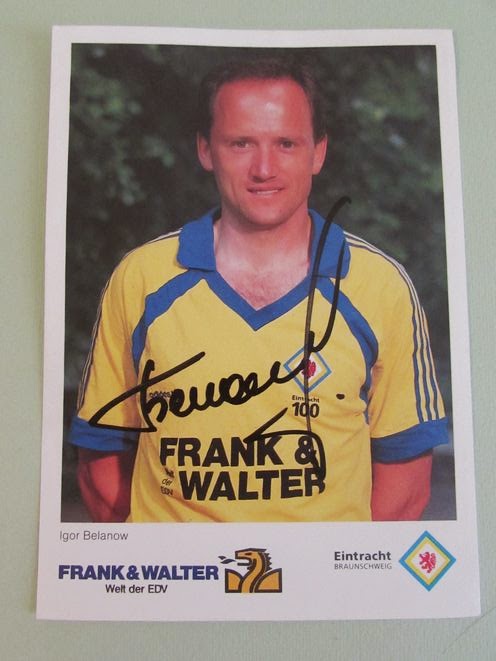 Lev Ivanovich Yashin (Russian: Лев Ива́нович Я́шин, 22 October 1929 – 20 March 1990), nicknamed as "The Black Spider" or "The Black Panther", was a Soviet-Russian football goalkeeper, considered by many to be the greatest goalkeeper in the history of the game. He was known for his athleticism in goal, imposing stature and reflex saves. He was also deputy chairman of the Football Federation of the Soviet Union.
Lev Ivanovich Yashin (Russian: Лев Ива́нович Я́шин, 22 October 1929 – 20 March 1990), nicknamed as "The Black Spider" or "The Black Panther", was a Soviet-Russian football goalkeeper, considered by many to be the greatest goalkeeper in the history of the game. He was known for his athleticism in goal, imposing stature and reflex saves. He was also deputy chairman of the Football Federation of the Soviet Union.Yashin earned iconic status for revolutionizing the goalkeeping position by stamping his authority on the entire defence. He shouted orders at his defenders, came off his line to intercept crosses and also ran out to meet onrushing attackers, done at a time when goalkeepers spent the 90 minutes standing in the goal waiting to be called into action. His performances made an indelible impression on a global audience at the 1958 World Cup, the first to be broadcast internationally, and dressed head to toe in black his nickname the 'Black Spider' enhanced his popularity.
Yashin appeared in four World Cups from 1958 to 1970, and in 2002 was chosen on the FIFA Dream Team of the history of World Cups. In 1994 he was chosen for the FIFA World Cup All-Time Team, and in 1998 was chosen a member of the World Team of the 20th Century. He made over 150 penalty saves and kept over 270 clean sheets in his career, winning a Gold medal at the 1956 Olympic football tournament, and won the 1960 European Championships. In 1963, Yashin was named the European Footballer of the Year, the only goalkeeper ever to receive the award. He was voted the best goalkeeper of the 20th century by the IFFHS.
 In 1954, Yashin was called up to the national team, and would go on to gather 74 caps. With the national team he won the 1956 Summer Olympics and the 1960 European Championship. He also played in three World Cups, in 1958, 1962 and 1966. Yashin is credited with four clean sheets out of the 12 games he played in the World Cup finals.
In 1954, Yashin was called up to the national team, and would go on to gather 74 caps. With the national team he won the 1956 Summer Olympics and the 1960 European Championship. He also played in three World Cups, in 1958, 1962 and 1966. Yashin is credited with four clean sheets out of the 12 games he played in the World Cup finals. The 1958 World Cup, played in Sweden, put Yashin on the map for his performances, with the Soviet Union advancing to the quarter-finals. In a group stage match against the eventual Cup winners Brazil, which the Soviet team lost 2–0, Yashin’s performance prevented the score from becoming a rout. He was selected into the All-Star Team that World Cup.
In 1962, despite suffering two concussions during the tournament, he once again led the team to a quarter-final finish, before losing to host country Chile.
 Despite the disappointment of the 1962 World Cup, Yashin would bounce back to win the Ballon d'Or in 1963. One of his best performances that year was the FA Centenary match, when he appeared in the ‘Rest of the World XI’ against England at Wembley Stadium,
and made a number of breathtaking and almost unbelievable saves. From
that point onward he was known all over the world as the "Black Spider"
because he wore a distinctive all-black outfit and because it seemed as
though he had eight arms to save almost everything.
But to his fans, he was always the fearless "Black Panther". He often
played wearing a cloth cap of burnt-brick colour. Yashin led the Soviet
team to its best showing at the FIFA World Cup, a fourth place finish in
the 1966 World Cup held in England.
Despite the disappointment of the 1962 World Cup, Yashin would bounce back to win the Ballon d'Or in 1963. One of his best performances that year was the FA Centenary match, when he appeared in the ‘Rest of the World XI’ against England at Wembley Stadium,
and made a number of breathtaking and almost unbelievable saves. From
that point onward he was known all over the world as the "Black Spider"
because he wore a distinctive all-black outfit and because it seemed as
though he had eight arms to save almost everything.
But to his fans, he was always the fearless "Black Panther". He often
played wearing a cloth cap of burnt-brick colour. Yashin led the Soviet
team to its best showing at the FIFA World Cup, a fourth place finish in
the 1966 World Cup held in England.Always ready to give advice to his comrades, Yashin even made a fourth trip to the World Cup finals in 1970, held in Mexico, as the third-choice back-up and an assistant coach. The Soviet team again reached the quarter-finals. In 1971, in Moscow, he played his last match for Dynamo Moscow. Lev Yashin’s FIFA testimonial match was held at the Lenin Stadium in Moscow with 100,000 fans attending and a host of football stars, including Pelé, Eusébio and Franz Beckenbauer.














